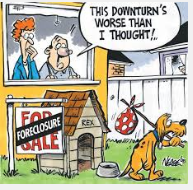From the Archives: Philadelphia’s Mortgage Foreclosure Diversion Program — July 2008.
Posted By Cliff Tuttle | August 15, 2015
No. 1,200
In order to celebrate Post No. 1,200, I am reprinting one of the first posts I wrote in this blog, dated July 21, 2008. At the time, the effects of the mortgage bubble collapse were being felt, including in Pittsburgh. Hundreds of mortgage foreclosure actions were being filed followed by default judgments in about a month. Philadelphia pioneered a program for putting the brakes on in order to determine whether modifications were possible. Allegheny County eventually followed suit. On April 16, 2009, PLBT reported: “The first mediation conferences under the Allegheny County Court of Common Pleas pre-foreclosure program were scheduled to begin last week, although some were postponed due to court closings for the memorial service for the three slain police officers. Judge McCarthy was scheduled to hold conferences in the morning and Judge James in the afternoon. The conferences, according to a report from an attorney involved in numerous cases, are to be held in chambers, not in open court.”
Here is my July 21, 2008 post:
On July 17, 2008, Philadelphia’s Court of Common Pleas adopted a Joint General Court Regulation to provide for conciliation conferences for owner-occupied residential properties facing sheriff sale.
The first cases to be conciliated will be those scheduled for sheriff sale in August and September. Because it is difficult to identify owner-occupied residential properties with certainty, all of the sheriff sales in August and September are being postponed to November and December unless the plaintiff’s counsel files a certificate stating that the property is not an owner-occupied residence by a fixed deadline. The plaintiff’s attorney must then send a document identified as the “Important Notice” to the Defendant, to give the Defendant an opportunity to file an “Objection.” Cases scheduled for Sheriff Sale in earlier months and not yet sold are eligible for conciliation if the defendant complies with the requirements of the regulation.
Cases where the complaint is filed on or after September 8, 2008 involving owner-occupied residential properties will be given a special designation and the conciliation is scheduled immediately after filing. If an owner-occupied residential property is not so-marked by the plaintiff’s attorney, the defendant can file a written request for a conciliation conference up to 10 days before the sheriff’s sale.
Other cases filed before September 8 will be conciliated if the homeowner files a certification and request for conciliation.
Meanwhile, an organization called Philadelphia Foreclosure Rescue Effort has been recruiting volunteer attorneys to give free representation to homeowners at conciliation conferences. The attorneys are given two and 1/2 hours of free training, with an optional additional hour of mortgage foreclosure defense training.
Will this work? Conciliations do produce settlements — provided that both parties are motivated. In cases where default judgments and writs of execution have been entered, there would seem to be little motivation for the plaintiff to settle. The options left to the defendant are not very many at that point. Moreover, the defendants have often become so delinquent by this time that there is no real prospect of rescue. On the other hand, plaintiffs have begun to worry about the threat of federal and state legislative action. They may not wish to look like they are not negotiating in good faith. Also, the prospect of doubling and tripling the inventory of real estate owned (REO) properties now looks very real.
But conciliations scheduled at the time complaints are filed may be very beneficial to both parties. The defendant may only be 90 – 120 days delinquent. The defendants have been paired up with lawyers who would be quite happy to file a response to the complaint if the negotiations do not pan out. Before then, 95% of them would have permitted default judgment.
Is Allegheny County considering its own mortgage foreclosure conciliation program? Would Philadelphia’s be a suitable model?
CLT
– See more at: https://www.pittsburghlegalbacktalk.com/archives/8#sthash.IZdvvG2P.dpuf




